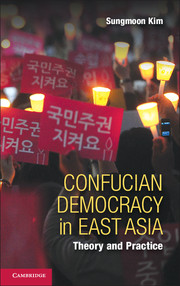Book contents
- Frontmatter
- Dedication
- Contents
- Acknowledgments
- Introduction
- Part I Beyond Thick Confucian Communitarianism and Meritocratic Elitism
- 1 Beyond Thick Confucian Communitarianism I: The Confucian Social Self and Its Discontent
- 2 Beyond Thick Confucian Communitarianism II: Toward Civil Confucianism
- 3 Against Meritocratic Elitism
- Part II Confucian Democracy in Theory – A Pluralist Reconstruction
- Part III Confucian Democracy in Practice – The Korean Case
- Bibliography
- Index
- References
1 - Beyond Thick Confucian Communitarianism I: The Confucian Social Self and Its Discontent
Published online by Cambridge University Press: 05 June 2014
- Frontmatter
- Dedication
- Contents
- Acknowledgments
- Introduction
- Part I Beyond Thick Confucian Communitarianism and Meritocratic Elitism
- 1 Beyond Thick Confucian Communitarianism I: The Confucian Social Self and Its Discontent
- 2 Beyond Thick Confucian Communitarianism II: Toward Civil Confucianism
- 3 Against Meritocratic Elitism
- Part II Confucian Democracy in Theory – A Pluralist Reconstruction
- Part III Confucian Democracy in Practice – The Korean Case
- Bibliography
- Index
- References
Summary
The recent resurgence of Confucianism in social and political theory is largely (if not exclusively) affiliated with the communitarian discontent and critique of liberalism in the West (particularly in North America) over the past two decades. Echoing Western communitarians who find fault with rights-based individualism as psychologically hollow (because of its assumption of the self-choosing, socially unencumbered self), ethically unpalatable (because of its priority of the right over the good), and politically undesirable (because of its tendency to erode communal bonds and civic virtue), recent Confucian political theorists criticize liberalism as too self-centered in its valorization of individual autonomy, will, choice, and (negative) freedom at the expense of communal solidarity and common good. Despite the still theoretically ambiguous connection between the democratic political regime and the communitarian society, many advocates of “Confucian democracy” recognize the communitarian elements in Confucianism as essential in the making of a viable Confucian democracy that is distinct from liberal individualistic democracy.
However, “Confucian communitarianism” as a political vision and practice is not without problems, the problems communitarianism is generally exposed to. Most important, it is still unclear whether communitarianism is theoretically superior to liberalism, or at least whether communitarianism can withstand the liberal critique of it. For instance, as far as I know, communitarians (including Confucian communitarians) have not yet successfully met the challenges that Stephen Holmes raised two decades ago. Holmes claims that while critiquing the liberal valorization of the unencumbered self, communitarians go to the other extreme by valorizing the “social self.” But why is the social self a better self than the autonomous self? Is “social” not a descriptive, rather than evaluative, term? Also, can sociality and individuality not be dialectically intertwined rather than starkly opposed by mediation of liberal political institutions and social practices? Then, are communitarians not confusing a particular version of liberal theory predicated on a speculative Cartesian epistemology of atomistic individualism with liberal social and political practice, which relies on a liberal education aimed at inculcating liberal virtues and characters? Are communitarians not mistaken when they think liberalism is essentially antisocial while the gist of liberalism lies in its reformulation (not abnegation) of the relationship between the self and society? Any attempt to justify Confucian communitarianism not merely as an antiliberal ideology but, more important, as a viable political vision and practicable theory, should be able to address (and overcome) these important challenges.
Information
- Type
- Chapter
- Information
- Confucian Democracy in East AsiaTheory and Practice, pp. 27 - 46Publisher: Cambridge University PressPrint publication year: 2014
